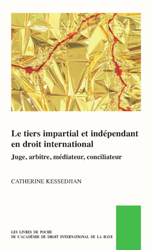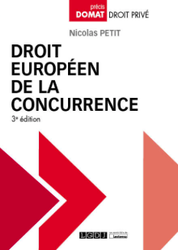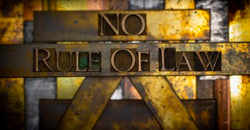Food for thoughts
Nov. 18, 2020
Teachings : Generall Regulatory law

La géographie est un élément qui demeure d'une grande pertinence dans la mise en place et la mise en œuvre des différentes régulations, ne serait-ce que parce que l'Histoire ne se pense pas sans la géographie, et que l'État ne se pense pas ni sans l'Histoire ni sans la Géographie, puisque dans un rapport consubstantiel avec le territoire et donc la clôture. Le Droit International Public repose sur cela, pour que les Etats, sujets de Droit international agissent dans un second temps dans l'espace international et notamment s'engagent les uns par rapport aux autres (traités internationaux).
Pourtant, confronter la Régulation et la Géographie conduit dans un premier temps à une aporie. En effet, à première vue, la Régulation, parce qu'expression de l'État, ne pourrait être que légitime sur un territoire national et, si on le décline juridiquement, qu'inséré dans le système juridique français. Or, le système juridique français étant construit d'une façon très particulière, sur la summa divisio du Droit public et du Droit privé, cela conduit certains à croire que le Droit de la Régulation serait une sorte de sous-branche du Droit public, puis à concentrer à titre principal l'attention sur la question des Autorités administratives indépendantes (AAI), puisque cela est familier au Droit public, tandis que les économistes bâtissent les règles qui gouvernent à travers le monde la Régulation sur un modèle qui serait totalement uniforme quelque soit l'endroit où il s'applique. Ce décalage conduit à ce qui peut apparaître à certains comme une sorte d"invasion" des catégories anglo-saxonnes, ne serait-ce que par le vocabulaire utilisé, lequel transporte avec lui les concepts du droit anglo-américain et ses méthodes. Il est vrai qu'en matière de régulation, les États-Unis, dont le droit a ses racines dans le droit britannique, a tendance (parce qu'ils en ont la puissance de faire) a appliquer leur droit d'une façon de fait extraterritoriale, par le vocabulaire et les concepts. On mesure ainsi que la puissance de droit dépend souvent de la puissance de fait. A cela, s'ajoute le relais de l'autorité, celle de la Cour suprême des États-Unis, par exemple, ou de la Cour de Justice de l'Union européenne. L'on finit par se dire que tout est, en matière de régulation, affaire de "coutume", c'est-à-dire de façon où les choses se font là où elles se font (conception allemande classique).
Dans cette grande dispute des territoires, l'on ne peut échapper à ces sorties, non seulement en raison des jeux de pouvoirs, mais parce que la Régulation est un appareillage technique sorti des objets, lesquels ne tiennent pas dans les frontières, la frontière étant une notion juridique affaiblie par le Droit économique, voire ennemie de celle-ci. Le rapport entre la Régulation et la Géographie va dès lors changer selon les secteurs, ce rapport demeurant étroit si l'objet technique régulé est corporel et immobile, le rapport se brisant si l'objet est immatériel. Mais la financiarisation de l'économie remet en cause cette gradation puisqu'elle dématérialise la corporéité de l'économie.
Plus encore, la question est de savoir si la Régulation doit prendre acte ou doit contrer l'habileté des opérateurs qui peuvent se soustraire au territoire, par le seul fait de bouger ou, par exemple, en créant des personnes morales ou bien en n'en créant pas (par l'action économique extérieure via de simples succursales non responsables). Si l'on estime que la Régulation est une théorie libérale qui pallie les défaillances techniques de marché, le Droit laisse cette habileté se déployer, voire on l'encourage. Si le Droit de la Régulation défend d'autres objectifs, cette habileté sera contrée. Des cas illustrent ces habiletés qui se confrontent, celles des opérateurs, des politiques et des régulateurs : le cas Péchiney- Triangle ou le cas BNPP, par exemple.
Se reporter au plan de la leçon 5
Consulter les slides de la leçon 5
Accéder au plan général du cours.
Consulter la bibliographie générale du cours
Consulter le Glossaire du Droit de la Régulation et de la Compliance
Consulter la Newsletter MAFR - Law, Compliance, Regulation
Consulter ci-dessous la bibliographie spécifique à la Géographie & la Régulation:
Nov. 16, 2020
Thesaurus : Soft Law
Full reference: US Securities and Exchanges Commission, Whistleblower Program. 2020 Annual Report to Congress, 16th of November 2020
Read, to go further on the question of whistleblowers:
- Frison-Roche, M.-A., The impossible unicity of the legal category of whistleblowers, working paper, 2019
Nov. 12, 2020
Thesaurus : Doctrine

Full reference: Kessedjian, C., Le tiers impartial et indépendant en droit international. Juge, arbitre, médiateur, conciliateur, Académie de Droit international de La Haye, 2020, 769p.
Read the forth of cover (in French)
Read the table of content (in French)

Nov. 1, 2020
Publications

This working paper served as a basis for an interview organized by Olivia Dufour in French in Actu-juridiques-Lextenso on 11st of January 2021.
Oct. 22, 2020
Interviews

Full reference: Frison-Roche, M.-A., "Health Data Hub est un coup de maître du Conseil d'Etat", interview realized by Olivia Dufour for Actu-juridiques, Lextenso, 22nd of October 2020
Read the news of 19th of October 2020 of the Newsletter MAFR - Law, Compliance, Regulation on which relies this interview: Conditions for the legality of a platform managed by an American company hosting European health data: French Conseil d'Etat decision
To go further, on the question of Compliance Law concerning Health Data Protection, read the news of 25th of August 2020: The always in expansion "Right to be Forgotten": a legitimate Oxymore in Compliance Law built on Information. Example of Cancer Survivors Protection
Oct. 22, 2020
Thesaurus : Soft Law
Full reference: Coeurquetin, R., Comparaison mécanique des versions 2017 et 2020 des recommendations de l'Agence Française Anti-corruption sur la cartographie des risques de corruption, October 2020, 9 p.
Read the mechanical comparison (in French)
To go further on the question of risk mapping, read Marie-Anne Frison-Roche's working papers: Drawing up Risk Maps a an Obligation and the Paradoxe of "Compliance Risks" and Anchor Points of the Risk Mapping in the Legal System
Oct. 19, 2020
Newsletter MAFR - Law, Compliance, Regulation

Full reference: Frison-Roche, M.-A., Conditions for the legality of a platform managed by an American company hosting European health data: French Conseil d'Etat decision, Newsletter MAFR - Law, Compliance, Regulation, 19th of October 2020
Read by freely subscribing the other news of the Newsletter MAFR - Law, Compliance, Regulation
___
News Summary: In its ordinance of 13th of October 2020, Conseil national du logiciel libre (called Health Data Hub), the Conseil d'Etat (French Administrative Supreme Court) has determined the legal rules governing the possibility to give the management of sensitive data on a platform to a non-europeans firm, through the specific case of the decree and of the contract by which the management of the platform centralizing health data to fight against Covid-19 has been given to the Irish subsidiary of an American firm, Microsoft.
The Conseil d'Etat used firstly CJEU case law, especially the decision of 16th of July 2020, called Schrems 2, in the light of which it was interpreted and French Law and the contract linking GIP and
The Conseil d'Etat concluded that it was not possible to transfer this data to United-Sates, that the contract could be only interpreted like this and that decree and contract's modifications secured this. But it observed that the risk of obtention by American public authorities was remaining.
Because public order requires the maintenance of this platform and that it does not exist for the moment other technical solution, the Conseil d'Etat maintained the principle of its management by Microsoft, until a European operator is found. During this, the control by the CNIL (French Data Regulator), whose the observations has been taken into consideration, will be operated.
We can retain three lessons from this great decision:
- There is a perfect continuum between Ex Ante and Ex Post, because by a referred, the Conseil d'Etat succeed in obtaining an update of the decree, a modification of the contractual clauses by Microsoft and of the words of the Minister in order to, as soon as possible, the platform is managed by an European operator. Thus, because it is Compliance Law, the relevant time of the judge is the future.
- The Conseil d'Etat put the protection of people at the heart of its reasoning, what is compliant to the definition of Compliance Law. It succeeded to solve the dilemma: either protecting people thanks to the person to fight against the virus, or protecting people by preventing the centralization of data and their captation by American public authorities. Through a "political" decision, that is an action for the future, the Conseil found a provisional solution to protect people against the disease and against the dispossession of their data, requiring that an European solution is found.
- The Conseil d'Etat emphasized the Court of Justice of The European Union as the alpha and omega of Compliance Law. By interpreting the contract between a GIP (Public interest Group) and an Irish subsidy of an American group only with regards to the case law of the Court of Justice of European Union, the Conseil d'Etat shows that sovereign Europe of Data can be built. And that courts are at the heart of this.
___________
Read the interview given on this Ordinance Health Data Hub
To go further about the question of Compliance Law concerning health data protection, read the news of 25th of August 2020: The always in expansion "Right to be Forgotten": a legitimate Oxymore in Compliance Law built on Information. Example of Cancer Survivors Protection
Oct. 15, 2020
Thesaurus : Soft Law

Full reference: Serious Fraud Office, Operational Handbook about Deferred Prosecution Agreements, October 2020
Oct. 14, 2020
Teachings : Compliance Law

Résumé de la leçon.
Le Droit de la Compliance semble être synonyme d"extraterritorialité, en ce qu'il se fit connaître d'une façon spectaculaire en 2014 par la décision américaine sanctionnant la banque française BNPP. L'on a dès lors souvent assimilé "Compliance" et extraterritorialité du Droit américain, englobant les deux dans la même opprobre.Celle-ci est par exemple d'une grande violence dans le rapport dit "Gauvain" de 2019. Mais sauf à croire que le Droit n'est que l'instrument pur du Politique, en raison des "buts monumentaux" poursuivis par le Droit de la Compliance, celui-ci ne peut avoir en tant qu'instrument qu'une portée extraterritoriale, sauf à être utilisé par une Autorité locale pour ne servir qu'un but local. Dans cette hypothèse, précise et restreinte, l'extraterritorialité du Droit de la Compliance doit être combattue, ce qui est fait par la Cour de la Haye dans sa jurisprudence de 2018. Mais pour résoudre cette question particulière, l'on risque de détruire l'idée même de Droit de la Compliance, lequel suppose l'extraterritorialité. Et au moment même où le continent asiatique est en train d'utiliser le Droit de la Compliance dans une définition mécanique pour mieux s'isoler.
Si l'on prend les autres sujets sur lesquels porte le Droit de la Compliance, lequel excède la question des embargos, l'on peut même soutenir qu'il a été fait pour ne pas être brider par les territoires, lesquels sont à la fois l'ancrage des Etats et leur intrinsèque faiblesse. L'internalisation dans les entreprises permet cela. Elle le permet tout d'abord par le mécanisme de "l'autorégulation". En effet, si l'on fait un lien, voire une identification entre la Compliance, l'éthique et l'autorégulation, alors la question des frontières ne se pose plus. Ainsi, l'entreprise s'auto-instituant non seulement comme un "néo-constituant" mais comme un ordre juridique complet, y compris dans le règlement des différents et dans les voies d'exécution (enforcement par le bannissement). La question de l'efficacité est donc réglée mais ouvre alors celle de la légitimité. C'est pourquoi l'Europe a vocation à porter une conception extraterritoriale d'une définition pourtant européenne de ce qu'est le Droit de la Compliance. C'est ce à quoi les arrêts de la Cour de justice de l'Union européenne du 24 septembre 2019 viennent de mettre un coup d'arrêt.
Se reporter à la Présentation générale du Cours de Droit de la Compliance.
Consulter le Dictionnaire bilingue du Droit de la Régulation et de la Compliance et la Newsletter MAFR - Law, Compliance, Regulation.
Consulter la Bibliographie générale du Cours de Droit de la Compliance
Consulter la bibliographie ci-dessous, spécifique à cette Leçon relative aux enjeux pratiques du Droit de la Compliance
Oct. 14, 2020
Thesaurus : Doctrine

Full reference: Petit, N., Droit européen de la concurrence, 3rd edition, Collection "Précis Domat Droit Public/Droit privé", LGDJ-Lextenso, 2020
Oct. 9, 2020
Thesaurus : Soft Law
Full reference: Financial Stability Board, The Use of Supervisory and Regulatory Technology by Authorities and Regulated Institutions. Market Developments and Stability Implications, Report of 9th of October 2020, 36 p.
Read the presentation of the report by the Financial Stability Board
To go further on the question of the use of new technologies in regulatory processes, read Marie-Anne Frison-Roche's working paper: Analysis of blockchains with regards with the uses they can fulfill and the functions that the ministerial officers must ensure
Oct. 6, 2020
Thesaurus : 05. CJCE - CJUE
Full reference: CJEU, Grand Chamber, 6th of October 2020, Privacy International c/ Secretary of State for Foreign and Commonwealth Affairs, C-623/17.
Read the summary of the judgment (in French)
Oct. 1, 2020
Thesaurus : Soft Law
Full reference of the guidelines: Commission Nationale de l'Informatique et des Libertés (CNIL), Délibération n°2020-091 du 17 septembre 2020 portant adoption de lignes directrices relatives à l'application de l'article 82 de la loi du 6 janvier 1978 modifiée aux opérations de lecture et écriture dans le terminal d'un utilisateur (notamment aux "cookies et autres traceurs") et abrogeant la délibération n°2019-093 du 4 juillet 2019
Full reference of the recommendation: Commission Nationale de l'Informatique et des Libertés (CNIL), Délibération n°2020-092 du 17 septembre 2020 portant adoption d'une recommandation proposant des modalités pratiques de mise en conformité en cas de recours aux "cookies et autres traceurs".
Read the guidelines (in French)
Read the recommendation (in French)
Read the presentation of these guilines and of this recommendation by the CNIL (in French)
Read Marie-Anne Frison-Roche's comment about this in the Newsletter MAFR - Law, Regulation & Compliance of 1st of October 2020
Sept. 29, 2020
Newsletter MAFR - Law, Compliance, Regulation

Full reference: Frison-Roche, M.-A., Judge between Platform and Regulator: current example of Uber case in U.K., Newsletter MAFR - Law, Compliance, Regulation, 29th of September 2020
Read by freely subscribing the other news of the Newsletter MAFR - Law, Compliance, Regulation
Summary of the news:
On 22nd of September 2017, Transport of London (TFL), London Transport Regulator, refused to renew the licence, granted on 31st of May 2012 for 5 years, authorizing Uber to transport people because of criminal offenses committed by Uber's drivers. On 26th of June 2018, The Westminster Court prolonged Uber's licence for 15 months under the condition that the platform prevent the reproachable behaviors of its drivers. After these 15 months, the TFL refused once again to prolonge Uber's licence because of the persistence of aggressions against passengers. Uber, once again, contest this decision before the Westminster Court.
In a decision of 28th of September 2020, the Court observes that during the 15 months, the platform implemented many measures to prevent aggressions, that the level of maturity of these measures has improved over time and that the number of offenses was reduced over the period (passing from 55 in 2018 to 4 in 2020). The Court estimated the the implementation of this actions is sufficient to grant a new licence to Uber.
We can learn three lessons from this decision:
- The Compliance obligation is not a result obligation but a mean obligation, which means that it is not reasonable to expect from a crucial operator (Uber, for instance) that it prevent every cases of agression but that it is salient to judge it on the effort it deploys to try to be closer to this ideal situation. Moreover, the crucial operator must be proactive, that is going away from the figure of passive subject of Law who apply measures enacted by the regulator in terms of fighting against aggressions to be an actor of the research of the best way to fight abusive behaviors, internalizing this "monumental goal.
- The judge appreciates the violation committed by those whose the firm is responsible "in context", that is evaluates the concrete situation in a reasonable way.
- It is the judge who decides in last resort and like the crucial operator, it must be reasonable.
Read to go further:
Sept. 28, 2020
Thesaurus : Soft Law
Full reference: Giuliani-Viallard, A., The Europe of Compliance, at the heart of tomorrow's world. For a transformation of our European businesses and the upturn in their international competitiveness, European Issue, n°572, policy paper from the Robert Schuman Foundation, 28th of September 2020, 3 p.
Sept. 24, 2020
Thesaurus : 09. Juridictions étrangères
Full reference: Constitutional Court of Belgium, 24th of September 2020, Décision concernant le recours en annulation partielle de la loi du 18 septembre 2017 relative à la prévention du blanchiment de capitaux et du financement du terrorisme et à la limitation de l'utilisation des espèces (decision concerning the partial annulment appeal of the law of 18th of September 2017 related to money laundering and terrorism financing prevention and to the restriction of the use of cash), n°114/2020
Read the law of 18th of September 2017 (in French)
Sept. 24, 2020
Newsletter MAFR - Law, Compliance, Regulation
The Economic Impact of Law: a new report about it. And what about Regulation & Compliance? 3 lessons

Full reference: Frison-Roche, M.-A., The Economic Impact of Law: a new report about it. And what about Regulation & Compliance? 3 lessons, Newsletter MAFR - Law, Regulation, Compliance, 24th of September 2020
Read by freely subscribing the other news of the Newsletter MAFR - Law, Regulation, Compliance
Summary of the news:
On 18th of September 2020, the European Economic and Social Committee (EESC) published a report about the impact of Rule of Law on Economic Growth.
The EESC defines the Rule of Law as the obligation to "all public powers act within the constraints laid down by law, in accordance with the values of democracy and fundamental rights, and under the control of independent and impartial courts". According to the Committee, the Rule of Law thus defined is favorable and even necessary to a durable economic growth especially because instability of regulations, absence of guarantee of labor and property rights, discrimination or non-application of contracts poorly favors or are detrimental for investments and economic agents' productive activities. The EESC observes by the way that countries which respect the Rule of Law grow more rapidly than those which do not respect it. The Committee also insists on the destructive effect of corruption which destroys public services, public action, public institutions on the long run and confidence, increasing inequalities.
Although EESC approves the actions of European Commission to advance Rule of Law in the Union, it however invites the Commission to continue its efforts by giving a more important place to jurisdictions and by protecting better media freedom in a context of rising autocratic forces in Eastern Europe.
We can learn three lessons from this report:
- The common interest of European Union States to guarantee the Rule of Law. Indeed, Rule of Law is not only written in article 2 of TFEU and has been consecrated by CJEU case law, it is also a condition of economic progress.
- The fight against corruption must be the object of a redoubled effort. In this perspective, Compliance Law is able to offer appropriate innovating legal tools.
- To a definition of Regulation and Compliance Law as a simple process of application of mechanical legal rules, it is necessary to substitute a definition of Regulation and Compliance Law based on the notion of "monumental goals" and people protection. In this perspective, these branches of Law would prove to be powerful tools in the service of the advancement of the rule of law in the European space.
Sept. 22, 2020
Newsletter MAFR - Law, Compliance, Regulation

Full reference: Frison-Roche, M.-A., Interregulation: way of "cooperation protocol" between Regulatory Bodies. Example between French Financial Markets Authority and Anticorruption Agency, Newsletter MAFR - Law, Compliance, Regulation, 22nd of September 2020
Read by freely subscribing other news of the Newsletter MAFR - Law, Compliance, Regulation
Summary of the news:
Although Regulation Law was born from the notion "sector", constant interferences between sectors and frequent interactions between some sectors and more general questions common to different sectors, make interregulation necessary. Compliance Law being the extension of Regulation Law, this interregulation mechanism is also necessary in Compliance Law.
This interregulation can take many legal paths like letters exchanges between regulators, the creation of a network of regulators and supervisors at the world level or about some specific question or the adoption of a "cooperation protocol" as the AMF (French Financial Market Regulator) and the AFA (French Anticorruption Agency) did on 16th of September 2020 to reinforce their respective fight against corruption, against market abuses and for the protection of investors.
This cooperation protocol between the AFA and the AMF has the following subjects:
- A more efficient methodology concerning the research and the analysis of corruption and market abuses.
- A more efficient prevention of corruption and market abuses.
- A better capacity to give recommendations of new regulations to the Legislator.
- A more rigorous monitoring of international works on the topic.
- A more coherent information for the public.
Are regulators the new teachers?
Sept. 21, 2020
Newsletter MAFR - Law, Compliance, Regulation

Full reference: Frison-Roche, M.-A., Regulation, Compliance & Cinema: learning about Internet Regulation with the series "Criminals", Newsletter MAFR - Law, Compliance, Regulation, 21st of September 2020
Read by freely subscribing other news of the Newsletter MAFR - Law, Compliance, Regulation
Summary of the news:
Season 2 Episode 3 of the British version of the series "Criminals" features the character of Danielle. Danielle is a mother which has decided to hunt down pedophiles on social networks in order to trap them and show to the world their acts. Danielle insists on the efficiency of her action with regard to the police and justice that she finds unproductive. In the episode, Danielle is accused of defamation by the police. While policemen try to explain to Danielle the importance of using a regular procedure and to respect the Rule of Law aiming to prove its accusations, she makes efficiency her only principle. According to her, her methods get results (on the contrary of those used by the police which respect procedures) and those she accuses to be pedophiles do not deserve defense rights.
We can learn three lessons from Danielle's story:
- If Compliance Law is just a process of application of mechanical rules, then Rule of Law is not salient face to the principle of efficiency. But, if Compliance Law is defined by its "monumental goals" and that the respect of Rule of Law is erected in "monumental goal", then efficiency and Rule of Law become compatible and congruent.
- The digital space must be disciplined by crucial digital firms supervised by public authorities, like in France or Germany for hate speeches and disinformation.
- Compliance Law, and Law in general, must be pedagogue towards individuals as Danielle which do not understand why their behaviors are reproachable.
Sept. 21, 2020
Law by Illustrations

This working paper is an extraction of an eponym newsletter published in the Newsletter MAFR - Law, Regulation & Compliance on 21st of September 2020 on LinkedIn.
Sept. 16, 2020
Publications

🌐follow Marie-Anne Frison-Roche on LinkedIn
🌐subscribe to the Newsletter MAFR Regulation, Compliance, Law
____
Full reference: M.-A. Frison-Roche, Se tenir bien dans l'espace numérique, in Penser le droit de la pensée. Mélanges en l'honneur de Michel Vivant, Lexis Nexis and Dalloz, 2020, pp. 155-168.
____
📝Read the article (in French)
____
English summary of the article: The digital space is one of the scarce spaces not framed by a specific branch of Law, Freedom also offering opportunity to its actors to not "behave well", that is to express and diffuse broadly and immediately hateful thoughts through Hate speechs, which remained before in private or limited circles. The intimacy of Law and of the legal notion of Person is broken: Digital permits to individuals or organizations to act as demultiplied and anonymous characters, digital depersonalized actors who carry behaviors that are hurtful to other's dignity.
Against that, Compliance Law offers an appropriate solution: internalizing in digital crucial operators the mission to disciplinary and substantially hold the digital space. The digital space has been structured by powerful firms able to maintain order. Because Law must not reduce digital space to be only a neutral market of digital prestations, these crucial operators, like social networks or search engines, must be forced to substantially control behaviors. It could be about an obligation of internet users to act with their face uncover, "real identity" policy controlled by firms, and to respect others' rights, privacy rights, dignity, intellectual property rights. In their Regulatory function, digital crucial firms must be supervised by public authorities.
Thus, Compliance law substantially defined is the protector of the person as "subject of law" in the digital space, by the respect that others must have, this space passing from the status of free space to the one of civilized space, in which everyone is obliged to behave well.
______
Read to go further:
- Frison-Roche, M.-A., L'apport du Droit de la Compliance à la gouvernance d'Internet, 2019
- Frison-Roche, M.-A. (dir.), Internet, un espace d'interrégulation, 2016
Sept. 11, 2020
Thesaurus : Soft Law
Full reference: Agence Française Anticorruption (French anticorruption agency), Département de l'appui aux acteurs économiques (Support to economic actors department), La politique cadeaux et invitations dans les entreprises, les EPIC, les associations et les fondations (Gifts and invitations policy for firms, public firms, associations and fondations), Guide pratique 2020 (Practical Guide 2020), 11th of September 2020, 14 p.
Sept. 7, 2020
Newsletter MAFR - Law, Compliance, Regulation

Full reference: Frison-Roche, M.-A., Conflict of interests & "revolving doors": what the European Ombudsman said in May 2020, the European Banking Authority agreed in August.Three lessons, Newsletter MAFR - Law, Compliance, Regulation, 7th of September 2020
Read by freely subscribing other news of the Newsletter MAFR - Law, Compliance, Regulation
Summary of the news:
Supervision and regulation authorities' impartiality and independence are conditioned to the fact that their members do not have any conflict of interest with the sector that they supervise or regulate. Such an absence of conflict of interest is necessary to guarantee a climate of trust between the authority and operators. This supposes that regulation and supervision authority members do not cumulate functions of operator and of regulator/supervision during but also after their mandate in the regulation/supervision authority because the anticipation of a future hiring can influence present decisions.
On 2nd of August 2019, the executive director of the European Banking Authority (EBA) informed the authority of its willingness to become PDG of the Association des marchés financiers en Europe, lobby of the financial sector. EBA approved this perspective. However, "Change Finance", a civil coalition, sized the European Mediator explaining that such a professional reorientation created an inevitable conflict of interest. The European Mediator reacted on 7th of May 2020 through a recommendation saying that although EBA took preventive measures, theses measures are not sufficient with regard to the risks. In this recommendation, the European Mediator also made some general propositions to manage future conflicts of interest:
- The interdiction for senior managers to have positions able to create a conflict of interest for two years.
- The information of senior managers and candidates to senior managers positions of the actual rules.
- The implementation of internal procedures blocking access to confidential information to the member who notified its willingness to occupy later a position able to constitute a conflict of interest with its current position.
In a letter of 28th of August 2020, the president of EBA told to the European Mediator that he accepts these remarks and propositions.
In this particular case, we can draw three lessons:
- The difficult articulation between independence/impartiality (necessary for trust) and regulator/supervisor expertise. The European Mediator and the ABE are agree that the interdiction to get some positions must be limited in time.
- The necessity that everyone can anticipate rules correctly.
- The necessity to preserve legal security.
Aug. 31, 2020
Newsletter MAFR - Law, Compliance, Regulation

Full reference: Frison-Roche, M.-A., Compliance by Design, a new weapon? Opinion of Facebook about Apple new technical dispositions on Personal Data protection, Newsletter MAFR - Law, Compliance, Regulation, 31st of August 2020
Read by freely subscribing other news of the Newsletter MAFR - Law, Compliance, Regulation
Summary of the news:
Personal Data, as they are information, are Compliance Tools. They represent a precious resource for firms which must implement a vigilance plan in order to prevent corruption, money laundering or terrorism financing, for examples. It is the reason why personal data are the angular stone of "Compliance by design" systems. However, the use of these data cannot clear the firm of its simultaneous obligation to protect these same personal data, that is also a "monumental goal" of Compliance Law.
In order to be able to exploit these data in an objective of Compliance and protecting them in the same time, the digital firm Apple adopted for example new dispositions in order to the exploitation of the Identifier For Advertisers (IDFA) integrated in the iPad and in the iPhone and broadly used by targeted advertising firms, is conditioned to the consumer's consent.
Facebook reacted to this new disposition explaining that such measures will restrict the access to data for advertisers who will suffer from that. Facebook suspects Apple to block the access to advertisers in order to develop its own advertising tool. Facebook guaranteed to advertisers who work with it that it will not take similar measures and that it will always favor consultation before decision making in order to concile sometimes divergent interests.
We can sleep and already make some remarks:
- GDPR imposing to companies that they guarantee a minimal level of protection for personal data does not apply in the United-States. It is then possible that Apple acted through Corporate Social Responsibility (CSR), more than through legal obligation.
- The mode of regulation used here is the "conversational regulation" theorized by Julia Black. Indeed, regulators let the forces in presence discuss.
- This "conversational regulation" does not seem to be very efficient in this case and an intervention of administrative authorities or of judges could be justified via Competition Law, Regulation Law or Compliance Law, knowing that Competition Law will favor access right to information and Regulation or Compliance Law private life right.
The whole paradox of Compliance Law rests in the equilibrium between circulation of information and secret.
Aug. 27, 2020
Newsletter MAFR - Law, Compliance, Regulation

Full reference: Frison-Roche, M.-A., "Interregulation" between Payments System and Personal Data Protection: how to organize this "interplay"?, Newsletter MAFR - Law, Compliance, Regulation, 27th of August 2020
Read by freely subscribing the other news of the Newsletter MAFR - Law, Compliance, Regulation
Summary of the news
Regulation Law, in order to recognize and draw the consequences from the specificities of some objects, has been build, at the start, around the notion of "technical sector" although their delimitation is partially related to a political choice. But, in facts, there are multiple points of contacts between sectors, actors moving from one to another as objects. The regulatory solution is so to climb over some technical borders through the methodology of interregulation which is by the way the only one to enable the regulation of some phenomena going beyond the notion of sector and related to Compliance Law.
This news takes the exemple of companies furnishing new payment services. In order to they can provide these services, these firms needs to access to banking accounts of concerned people and so to very sensitive personal data. Regulation of such a configuration needs a cooperation between the banking regulator and the personal data regulator. Legislation being not sufficient to organize in Ex Ante this interregulation, the European Data Protection Board has published some guidelines on 17th of July 2020 about the way it conceives the articulation between the PSD2 (European directive about payment services) and GDPR and has announced that it intended to expand the circle of its interlocutors to do this interregulation. Such an initiative from EDPB can be justified by the uncertainty about how interpreting both texts and articulating them.